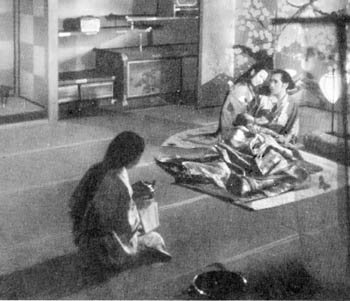![[Metroactive Movies]](/movies/gifs/movies468.gif)
[ Movies Index | Show Times | Silicon Valley | Metroactive Home | Archives ]

Ghost Story: Kenji Mizoguchi's 'Ugetsu' has been ranked on international film critics' Top 10 lists. Potter's Field Stanford film series screens Mizoguchi masterpiece 'Ugetsu' IF YOU were Japanese, I wouldn't have to explain who Kinuyo Tanaka (1909-77) is. Not having that honor, I couldn't place her name until I looked it up. Tanaka was an actress in 250 Japanese films. A free-admission retrospective of Tanaka's films is running through March 2 at the Cubberley Auditorium on the Stanford campus. The Feb. 2 feature is Kenji Mizoguchi's immortal Ugetsu (1953). "That most perfect of all films," critic Donald Ritchie called Ugetsu; it was often a regular finalist on lists of the Top 10 films of all time. Mizoguchi's movie is both a love story and a ghost story. This fable of war couldn't seem more timely to a blue-state American audience. And it could have only been made in a nation that had just been through a terrible war. Ugetsu is illuminated by Japan's realization of having been duped by criminal pride, by the hopes of glory and gain. Yet Mizoguchi, who came from poverty, didn't have pretty illusions of rural life. The scene of Tanaka patiently hand-cranking her husband's pottery wheel is both a tender vision of how a married couple are yoked together by their work and a reminder of how hard that work is. The action takes place in the Japanese middle ages, a time of civil war. In a village, the potter Genjuro (Masayuki Mori) and his wife, Miyagi (Tanaka), are trying to make a fast profit from their wares. Their neighbor is a farmer named Tobei (the very comic Saka Ozawa), who has idiot ambitions to be a samurai's squire, and his wife, Ohama (Mitsuko Mito). The quartet sail to the nearby city, across a lake of Murnau-like mysteriousness. In town, the husbands are separated from their wives. Tobei gets his foolish wish and his sword; his wife has, in her bitter summing-up, "my own destiny and career." But after Genjuro sends Miyagi back alone, she and his infant son are assaulted by starving stragglers from one of the samurai armies that pass through the village. Meanwhile, Genjuro finally gets some recognition for his pottery skills; the great Lady Wakasa lures him to her home. It's a pavilion of unearthly calm. Indeed, the beauty is not of this earth. Enchanted, Genjuro loses track of the time. But there is to be one last reunion between the potter and his abandoned wife. "Painterly" is too often a synonym for "static," but in this breathtaking allegory of the seductive side of war, Mizoguchi uses his camera with the studied simplicity of a sumi brush artist. The use of sound is also expert—the melancholy bell chiming in Lady Wasaka's home or the moan-singing of a ghost through a suit of armor. Tanaka's last scene is of a wife heating sake; as her husband drowses under the influence, she slowly shudders, holding back a sob. In her instant of contentment, she had temporarily forgotten her fate. And her husband had missed it all, as always. This moment of high tragedy is mitigated in the legendary final shot: the camera rising like the sun over the image of the earth being tended, nourished with our beloved dead.
Ugetsu (1953) plays Feb. 2 at 7:30pm at Cubberley Auditorium, Stanford. Admission is free.
Send a letter to the editor about this story to letters@metronews.com. [ Silicon Valley | Metroactive Home | Archives ]
|
From the January 26-February 1, 2005 issue of Metro, Silicon Valley's Weekly Newspaper.
Copyright © Metro Publishing Inc. Metroactive is affiliated with the Boulevards Network.
For more information about the San Jose/Silicon Valley area, visit sanjose.com.